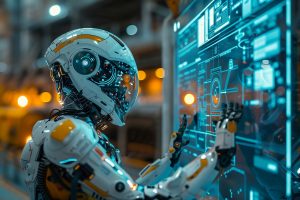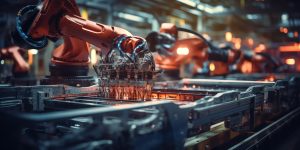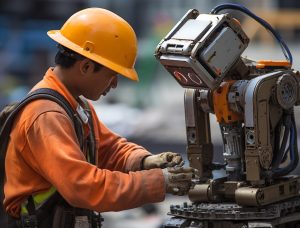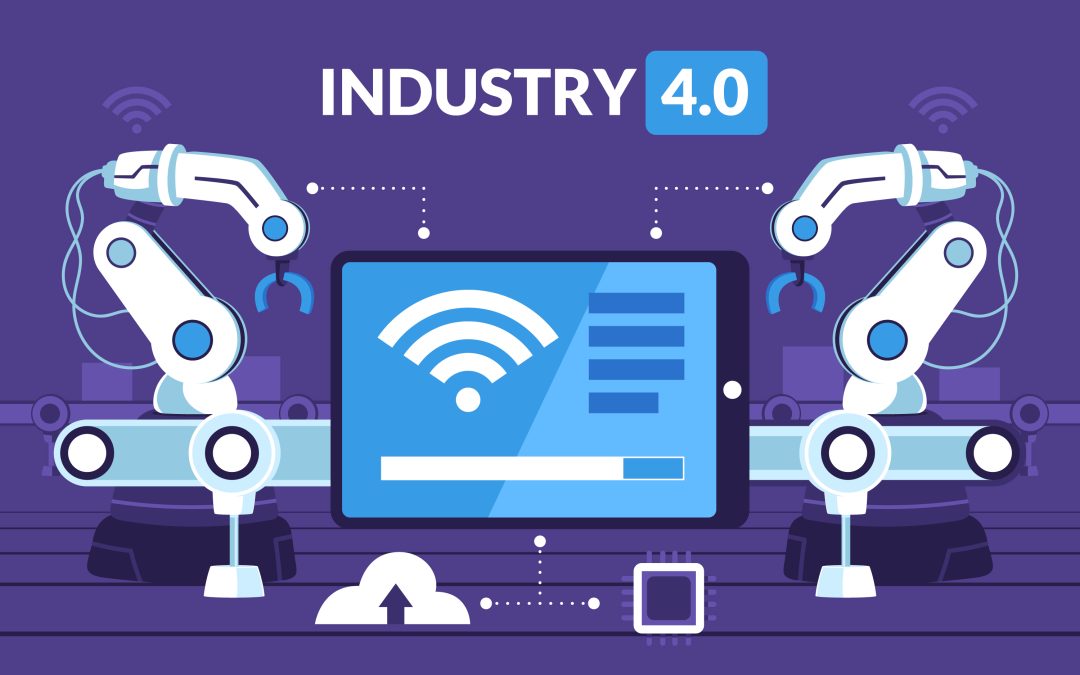In this post we are going to discus about The The Crucial Role of AI in Industry Automation. AI or artificial intelligence is no longer a notion confined to science fiction films but a reality that is becoming reality through automated processes.
It is a true technology which is engineering revolutions in multiple industries making machines capable of performing tasks that once required exceptional human intelligence. Use of artificial intelligence in industry automation is a very important and essential transition for those businesses that strive to face competition on the market that is dynamically changing.
What is AI in Industry Automation?
In layman terms, AI in industry automation means that intelligent machines and software are employed to carry out tasks that realistically humans usually do, having specialized intelligence. This requires the bot to grasp and evaluate data, as well as to comprehend the decisions already done and learn from bygone incidents.
One of the most obvious effects of AI is its wide application in different sectors, such as banking, retailing, and entertainment but in industry and the role of AI in industry automation of manufacturing is considerable.
Role of AI in Industry Automation
Industries around the world are facing new challenges every day, including the need for higher efficiency, better quality, and reduced costs. To keep up with these demands, businesses need to rethink how they use their machines and systems. This is where AI comes in. AI can help industries automate processes, making them more responsive and adaptive to changes.
According to Forrester, 16% of US jobs will be replaced by 2025. This shift doesn’t just mean job losses but also the creation of new opportunities in AI-related fields.
How AI is Transforming the Manufacturing Industry?

Increased Productivity
Use of artificial intelligence in industry automation enhances the productivity of machines as they can now work faster and more gracefully than before. To elaborate, robots take over the jobs that require high accuracy and fast repetitions. They reduce the human labor. This is not only method that increases efficiency but also guarantees the uniform quality level.
Checkout: 7 Ways How Automation Increases Productivity in Industries
Reduced Costs
AI implementation might seem expensive at the beginning, but ultimately it is very cost-effective. The AI machines can help to decrease the number of people in the factory, increase accuracy and efficiency of product delivery.
In companies providing software services, AI-powered systems can replace some human tasks, such as monitoring and process automation. This reduces costs and increases efficiency.
Enhanced Quality
Advanced AI enabled equipment can pick product flaws more precisely than examine ever before possible. AI can do this by using sophisticated image processing algorithms. As a result, AI can even detect some items’ defects to guarantee higher quality standards. This is how customers satisfaction is improved, and you lessen the waste.
AI in Predictive Maintenance
One of the most-precious is AI application in Predictive maintenance. AI can trace the data which comes out of the machine and from it, predict the time and schedule the repair process before any failure. It prevents it from being downtime and that saves income on emergencies repair.
Top AI Technologies in Manufacturing

Machine learning (ML)
ML (machine learning) is one of the most important types of AI, which permits computers to obtain new knowledge from data without the need of being coded. In the manufacturing sector, ML takes the position of optimizing production processes, supply chain management, and even market trend forecasting are also possible.
Deep Learning
Deep Learning, a subset of ML, uses neural networks (artificial elements) to process a large database. In particular, it is one of the most convenient solutions which is usually used for face and speech identification.
In manufacturing, deep learning is used for quality control by detecting defects on real-time. Because of the sound technology, a smarter judgment can be made.
Collaborative robots (Cobots)
Robots that work together with humans. These are robots designed to cooperate with humans in the working environment. They are conceptualized, designed, and fabricated to work together with humans. They are considered as advantageous in productivity and work efficiency. They are now considered complementary of human labor and not as a replacement for human engagement.
For example, driverless or dare I say piloted vehicles, are able to do tasks like picking items and the Artificial Intelligence has mastered this task to make it safer. Unlike ordinary robots, Collaborative Robots (cobots) are more adaptable for programming and easier to learn by human workers.
Digital Twins
A digital twin is a virtual replica of an object or system that is in the physical world. In manufacturing, digital twins can model production processes, find potential resolutions or test solutions on virtual existence without interference of real operations.
Checkout: Key Difference Between Industrial Automation and Robotics
Benefits of AI in Industry Automation

Data-Driven Insights
In contrast to shrinking labor pools and the abundance of data, AI can analyze industrial machine data and generate meaningful insights. They end up having more knowledge about the customers thereby helping them in making good decisions for improving their operations.
Enhanced Safety
The best use of artificial intelligence in industry automation is that AI can perform dangerous operations while shifting responsibilities to machines and reduce the chances of physical harm in the manufacturing sector. As such, robotic work may be a replacement for humans handling hazardous materials or even extreme environments.
Scalability
Average productivity decline can easily be covered with the use of AI tools. This aspect therefore means that the growth of your business will not cause a reconfiguration of your AI as it already grows alongside the business.
Checkout : 10 Key Benefits of Automation in Manufacturing Industry.
Conclusion
The integration of artificial intelligence in industrial automation is now not an option at all, but a mandatory necessity for firms wishing to be on par with competition. AI in industry automation is very productive on the side of making a company more efficient and reducing the costs, and in the other side it raises the quality and safety.
By adopting artificial intelligence in industry automation, businesses can not only improve their current operations but also pave the way for innovative solutions and smarter manufacturing techniques. It’s time to embrace AI and transform the way industries operate for a more efficient and prosperous future.
